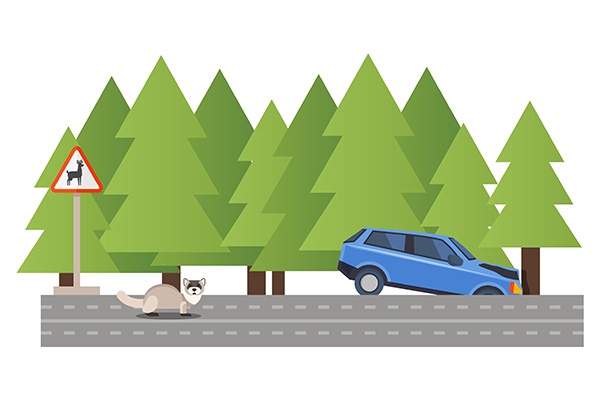
Animal collisions are a real concern, especially if you often drive through rural areas or places where wildlife frequently crosses the road. Striking an animal can be distressing, costly, and dangerous, and knowing how to reduce the risk is important. Luckily, with some proactive measures, you can significantly decrease your chances of encountering an animal-related accident.
1. Stay Alert, Especially at Dawn and Dusk
Many animals, particularly deer, are most active around dawn and dusk. These are times when visibility is also challenging for drivers, creating a perfect storm for collisions. By staying vigilant during these hours, you can be better prepared to react quickly if an animal suddenly appears in your path. Remember that animals can appear quickly, often from wooded areas or tall grass alongside the road, so keep a close watch on both sides of the roadway.
2. Use Your High Beams Wisely
High beams can be an effective tool for spotting animals ahead, as they illuminate the sides of the road, giving you a broader view of potential hazards. However, make sure to dim your high beams for oncoming traffic to avoid blinding other drivers. If you see a pair of bright, glowing eyes in the distance, it's a telltale sign that an animal might be in the vicinity. Slow down and be prepared to stop if necessary.
3. Reduce Your Speed in High-Risk Areas
If you’re driving through areas known for animal crossings, reducing your speed can significantly lower your chances of a collision. Slower speeds give you more time to react if an animal steps onto the road. Additionally, if a collision is unavoidable, hitting an animal at a lower speed can reduce the severity of the accident for both you and the animal. Road signs indicating frequent animal crossings are usually placed in areas with a history of animal activity, so treat them as a warning to be extra cautious.
4. Stay in Control When an Animal Crosses Your Path
If you suddenly encounter an animal on the road, your instinct might be to swerve. However, swerving can lead to an even more dangerous situation, like colliding with another car or losing control and going off the road. Instead, try to brake firmly while keeping your vehicle as straight as possible. This reduces the risk of a rollover and allows you to maintain control. If it’s impossible to avoid hitting the animal, doing so head-on while in control of your vehicle is often safer than trying to maneuver sharply around it.
5. Look for Herd Animals and Signs of Activity
Many animals, like deer, tend to travel in groups. If you see one, there’s a good chance more are nearby. After one animal crosses the road, proceed with caution, as others may follow. Also, be attentive to signs of animal activity along the side of the road. For instance, you might see tracks or hear rustling in the bushes, which can signal that animals are nearby.
6. Consider Installing a Wildlife Warning Whistle
Wildlife warning whistles are small, affordable devices that can be attached to the front of your vehicle. When you’re driving, they emit a high-pitched sound that’s meant to alert animals of your approach. While the effectiveness of these whistles is debated, many drivers feel they offer an added layer of precaution. Even if it doesn’t guarantee that animals will stay off the road, a whistle could make a difference in warning animals, especially in quieter, rural areas.
7. Understand the Seasons and Animal Patterns
Certain seasons bring animals closer to roads as they search for food, water, or mates. Fall, for instance, is deer mating season, which means deer are more active and likely to wander near highways. In areas prone to seasonal animal activity, stay particularly vigilant and consider adjusting your driving route or timing if possible. Recognizing these patterns can help you be more prepared and attentive when you know animals are likely to be active.
8. Keep Your Windshield and Headlights Clean
Visibility plays a critical role in spotting animals early. Regularly cleaning your windshield and headlights ensures you have a clear view of the road and its surroundings. Dirty headlights can reduce the distance you can see at night, limiting your ability to detect animals in time to react. Clear windshields make it easier to spot movement, glare, and obstacles on the road, so keeping them clean is worth the extra time.
Be ready for any drive with reliable, professional service from db Orlando Collision. From inspections to maintenance, we’ll make sure your car is safe and road-ready. Schedule your appointment now!